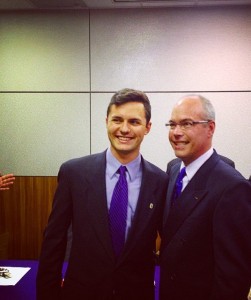I remember my first day in school at Georgia Military College. It was quiet on campus. The freshly cut green yard had signs that said, “No walking on grass.” The buildings, looming with castle-like features, faced each other across that untouchable landscape. Where in the world was I? Was this college? What kind of hard work would I have to do here? It definitely didn’t look like the movies.
That was the question I asked myself when I attended the first day of school at Georgia Military College (GMC). I had always dreamed of going to college, playing next-level soccer, and that the military was a part of that dream. Georgia Military College had that perfect mesh, or so I thought. In the end, however, I must tell you that GMC was quite frankly one of my only choices.
Let’s quickly rewind to the last year of my high school career. I had one of the best senior classes. The high school football season was incredible. Soccer was my life and I was deeply set on going to the next level by being a part of travel teams and a state-bound varsity team. I was attending other sporting events, painting up, hanging out at house parties, and preparing myself for prom and graduation.
The only thing I was worried about was enjoying the last few months with my friends and making sure they were to die for. I was definitely not worried about hard work or life after high school.
Then, I noticed something quite peculiar about my friends. They were all getting acceptance letters from schools… University of Georgia. Georgia Tech. Alabama. Auburn. Georgia Southern.
I had been in contact with tons of soccer coaches around the nation to join a college team, but I had no acceptance papers to waive in the air. I was never in that sort of rush. Once I saw some of my friends’ acceptance letters, I realized my time in high school was coming to an end.
I remember going home and emailing a lot of my coaches and seeing how I could finalize the signing process. The only problem was that I was afraid my grades were not going to get me far. That was one thing I did not put the most attention toward in high school.
I had many schools at the top of my list, but at the end of the day, many of them did not have me at the top of their list. In the finale of my high school days, I chose my best match, Georgia Military College, because of the potential soccer scholarship, military ideals, small size, the good price, and the proximity to home, and… because they accepted me.
Now, back to that first day at Georgia Military College. The only people I saw were military-dressed students lining up in formation outside one of the buildings.
Two older gentlemen, dressed in army camouflage breezed by me as I watched others in formation. I could see two edges of campus, given how relatively small in size the school’s property was. A single flag pole stood in the middle to break the uneasy silence, crackling in the late summer wind.
The semester began fast and, before I knew it, soccer was starting too. After a few weeks, I wasn’t sure if I had made the right choice. I remember thinking how I had let myself down in high school by not having the right mindset and how that culminated to where I was. GMC was almost too small – smaller than my high school actually.
It was close to home, but the town did not offer a quarter of what my hometown offered. On top of everything, I kept getting crushed by the response of people when I told them I was attending a junior college. I could sense that people considered junior college students as underachievers. It’s a stigma all community college students face.
I dreaded going to class. I didn’t feel at home and I didn’t feel like I was meeting many people. I felt like I was making no progress. I wanted to leave.
I researched other schools while I was in class. “Anything,” I thought. I looked around in the state of Georgia and even out of state. Where could I go that was more traditional? Where would I get accepted? I applied to Kennesaw State University (KSU), where most of my closest friends went.
I was going to get out of Georgia Military College and move on to bigger things, I thought. However, within a month, KSU replied back. I vividly remember opening that letter in front of my parents, who knew the bad news before I did. “Unfortunately,” it read atop the page. I was not accepted. I was crushed. I was officially stuck in a town where I felt I didn’t belong and stuck at a school where I felt I was going to make no progress.
The next semester started and I promised myself that I would be more attentive to school and that I would get more involved – something I had never really paid full attention too. I thought if I worked my tail off, maybe I could get into Kennesaw State University the following year.
I studied every night. I read the textbooks. I went to the library. I never missed a class – not even my 7:50am classes. I focused on putting in the time on the soccer field. No more video games. No more wasting time. I started working a job at a sandwich restaurant in order to gain some capital for whichever school was next. My life was moving. I noticed an increase in my GPA and I was making the Dean’s List. My bank account had also increased. My soccer team was doing better than it had ever done in the history of the school.
I felt like everything was working out toward that ultimate goal of transferring. The best news, however, was when I heard in one of my classes that there was an invite-only honor society for students, which helped most students get into large four-year universities. I talked to my teacher after class and tried to figure out how I could get involved.
I thought that they could help me transfer. She saw my GPA and then told me that it was possible that I could get a letter in the mail. I waited and waited and it finally arrived: one of the most pivotal moments in my life. I called my parents and begged them to help me with the membership fees.
The next semester I was inducted into Phi Theta Kappa (PTK). I felt on top of the world. I reviewed what I did and realized that if I focused more and gave more effort then more things would happen like PTK. So I focused more and gave more effort. I was elected Chapter President of Phi Theta Kappa at my school (Alpha Omicron Epsilon) and then selected as Phi Theta Kappa Regional President.
I helped host the Regional Convention and I earned the Distinguished Order of the Leader Servant Award, which represented 100+ hours of community service. I met with the mayor of our town, the president of our school, and many other distinguished people. I couldn’t believe what I had reached and the experiences I was having. I didn’t want to leave.
This school was the exact opposite of what I thought. The culture was amazing. The people and faculty were like family. Everything I wanted in a school was right in front of me the whole time.
The problem was that I had never given it enough – but when I did, the door to opportunity opened up right in front of me.
My last semester approached of junior college and it was time for the next step: applying to a four-year university. It was a weird experience for me, having already been let down by other schools. Georgia Military College was where I wanted to be.
I didn’t think I would have a better time anywhere else. Then, I thought to myself, “Corey, this school is a stepping stone. It is where you realized your potential. It’s where you realized what it takes to be successful. Now replicate you hard work at the next school. Make your impact on a larger scale.”
My faculty, advisors, and PTK members helped me begin the process that every student in junior college goes through: transferring to a larger university. It is very common to receive an Associate’s Degree and then continue on towards a Bachelor’s – its’ actually the new norm.
My dad told me to create a list and do research on what each school offered. He told me to dream big and to not limit myself. I started creating a list and of course Kennesaw State was at the top… I knew that I could get in now. I remember speaking with dad and he said, “You know there are more schools than KSU right? Why don’t you try some other ones?” Eventually, after I did my research, I realized he was right.
My list extended and Kennesaw dropped to 9th of 15 possibilities. Schools like Georgia Tech, The University of Florida, Florida State University, Flagler College, Auburn University, The University of Georgia, University of Central Florida, and The University of South Florida were on the list (not in that order). I couldn’t believe it, but every school I wanted to go to was now an option.
I applied to each one and the first one to come back was the one I had longed for… Kennesaw State. “Accepted.” I showed my parents and then shared with all of my friends that I had been accepted.
The decision to attend KSU was made before I could realize it. Even though I had put Kennesaw at 9th, it bolted back to the top. I was looking up where to live, talking to friends who lived there, and looking at everything 50 times on their website. It was going to be incredible.
Then, a letter came in a few weeks later: The University of Georgia. The most prestigious and traditional school in my state.
The school that students with perfect GPA’s and SAT scores got denied from. The outside of the envelope said it all, “Accepted.” I couldn’t believe it. The University of Georgia accepted me.
Suddenly, my dreams of attending Kennesaw were sent into limbo. I laid both envelopes on my desk and watched many others come in over the next few weeks. Most were hand-written and some with special offerings and educational scholarships. With a little hard work, things were beginning to fall in place… I was always set on going to Kennesaw, but after a long decision process, and a talk with my parents, The University of Georgia would be my next home.
There is a major quote that is probably over said that I would like to share. It is and probably always will be my favorite quote: “If you do what you’ve always done, you’ll get what you’ve always got.” – Antony Robbins. The truth of that quote is far more than I can explain in my college story and it speaks wonders to me.
By working hard and changing what I always did, things began to change for me. I had been accepted to The University of Georgia. After attending the Phi Theta Kappa National Conference in San Jose, California, I was offered a position with the World Leading Learning Company, Pearson Education.
I have since then been promoted to Regional Coordinator position in the Pearson Campus Ambassador Program. I also participated as a Social Media Strategist and started my own blog, coreygeary, which has produced over 7,000 views to date.
I have traveled to San Jose, New York City, Disney World, Boston, and I look to travel to San Antonio and San Francisco this year all thanks to the opportunities at my job and school. I have given speeches in front of students and wrote many articles on why students need to give it their all. I am currently a senior at The University of Georgia where I attend classes at The Terry College of Business, one of the nation’s most prestigious undergraduate business schools.
I have also taken on the role of a second job in student housing. In May of 2016, I will graduate with a Bachelors of Business Administration in Management. On top of all of that, I am currently co-founding a business that focuses on the importance of mentorship to students, which will make its debut in the fall of 2016. Life is moving forward at light speed.
I am just an example of the thousands of students who change their future – whether they start in Junior College or not. It doesn’t matter where you come from or where you are; you control your future.
From what I knew four years ago out of high school to now, the most important lesson I can reiterate is that quote by Antony Robbins. If I had stayed on that path of doing just enough and quitting when things got too bad to go back to old ways, then I would have not had the experiences that I’ve had. It’s about being persistent and making the change you want to see. You are what you make yourself.
One last note: If it wasn’t for the people I’m about to thank, that change would have been very hard to accomplish. I want to personally thank my mom and dad for being by my side every step of the way. Being a first generation college student has a lot of pressure on a family and you two took all of the pressure off of me with your support and love.
Thank you to Mrs. Zipperer, Lt. Col. Edward Shelor, and Celes Mason for molding me into a leader and showing me the way to success at Georgia Military College. Thank you to Pearson and Kara Manis for giving me a chance to lead and create, and to be a part of the Pearson Family. Thank you Allison Jones for being a mentor far before you were my official mentor.
Thank you to my family and friends, and importantly those who walked with me at Georgia Military College and at Phi Theta Kappa who took on a similar mission. I couldn’t have done it alone.










